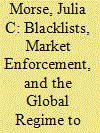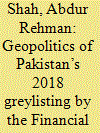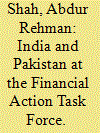| Srl | Item |
| 1 |
ID:
168197


|
|
|
|
|
| Summary/Abstract |
This paper highlights how international organizations can use global performance indicators (GPIs) to drive policy change through transnational market pressure. When international organizations are credible assessors of state policy, and when monitored countries compete for market resources, GPIs transmit information about country risk and stabilize market expectations. Under these conditions banks and investors may restrict access to capital in noncompliant states and incentivize increased compliance. I demonstrate this market-enforcement mechanism by analyzing the Financial Action Task Force (FATF), an intergovernmental body that issues nonbinding recommendations to combat money laundering and the financing of terrorism. The FATF's public listing of noncompliant jurisdictions has prompted international banks to move resources away from listed states and raised the costs of continued noncompliance, significantly increasing the number of states with laws criminalizing terrorist financing. This finding suggests a powerful pathway through which institutions influence domestic policy and highlights the power of GPIs in an age where information is a global currency.
|
|
|
|
|
|
|
|
|
|
|
|
|
|
|
|
| 2 |
ID:
179858


|
|
|
|
|
| Summary/Abstract |
This article argues that, in addition to the valid reasons for Pakistan’s greylisting by the Financial Action Task Force (FATF) in 2018, geopolitical dynamics also played a crucial role behind this development. While the United States (US) under the Trump administration pushed Pakistan to seek an end to “the longest war” in Afghanistan, India, hoping to curb cross-border terrorism, capitalized on this momentum to pressure Pakistan. In order to hastily greylist Pakistan, institutional procedures of the FATF were thus disregarded. The case study demonstrates how economic coercion was used to push Pakistan to accept US and FATF demands. This article argues that Pakistan’s greylisting has created a win-for-all scenario for now. But these gains should not be overrated. Pakistan’s implementation of FATF requirements faces significant structural limitations. Still, the consensus between major actors underscores the potential of the FATF to counter money laundering and financing of terrorism globally.
|
|
|
|
|
|
|
|
|
|
|
|
|
|
|
|
| 3 |
ID:
184765


|
|
|
|
|
| Summary/Abstract |
Ever since the grey-listing of Pakistan by the Financial Action Task Force (FATF) in early 2018, India and Pakistan have been vying for competing goals. According to Indian perspective, Pakistan is still engaged in cross-border terrorist activities in Indian territories. Therefore, Pakistan must be downgraded to black-list. On the other hand, Pakistan insists it has taken ample measures to comply with FATF demands. According to Islamabad, not only has Pakistan started taking actions against domestic militant units, it has been playing vital role in facilitating ‘peace talks’ to end the Afghan war. In contrast, this article argues both of these narratives verge on extremes in their own respects. India’s recent claims about cross-border terrorism are profoundly diluted by domestic resistance it has been facing in Indian-administered Kashmir of late. Moreover, a black-listed Pakistan could pose an even bigger challenge. Similarly, this article argues that getting Pakistan off the grey list would be too early at the present time. The country still needs to implement half of its ‘action plan’ as identified by the FATF. A more realistic option, therefore, would be to take the middle ground and proceed with current FATF supervision of Pakistan’s performance for a further period.
|
|
|
|
|
|
|
|
|
|
|
|
|
|
|
|